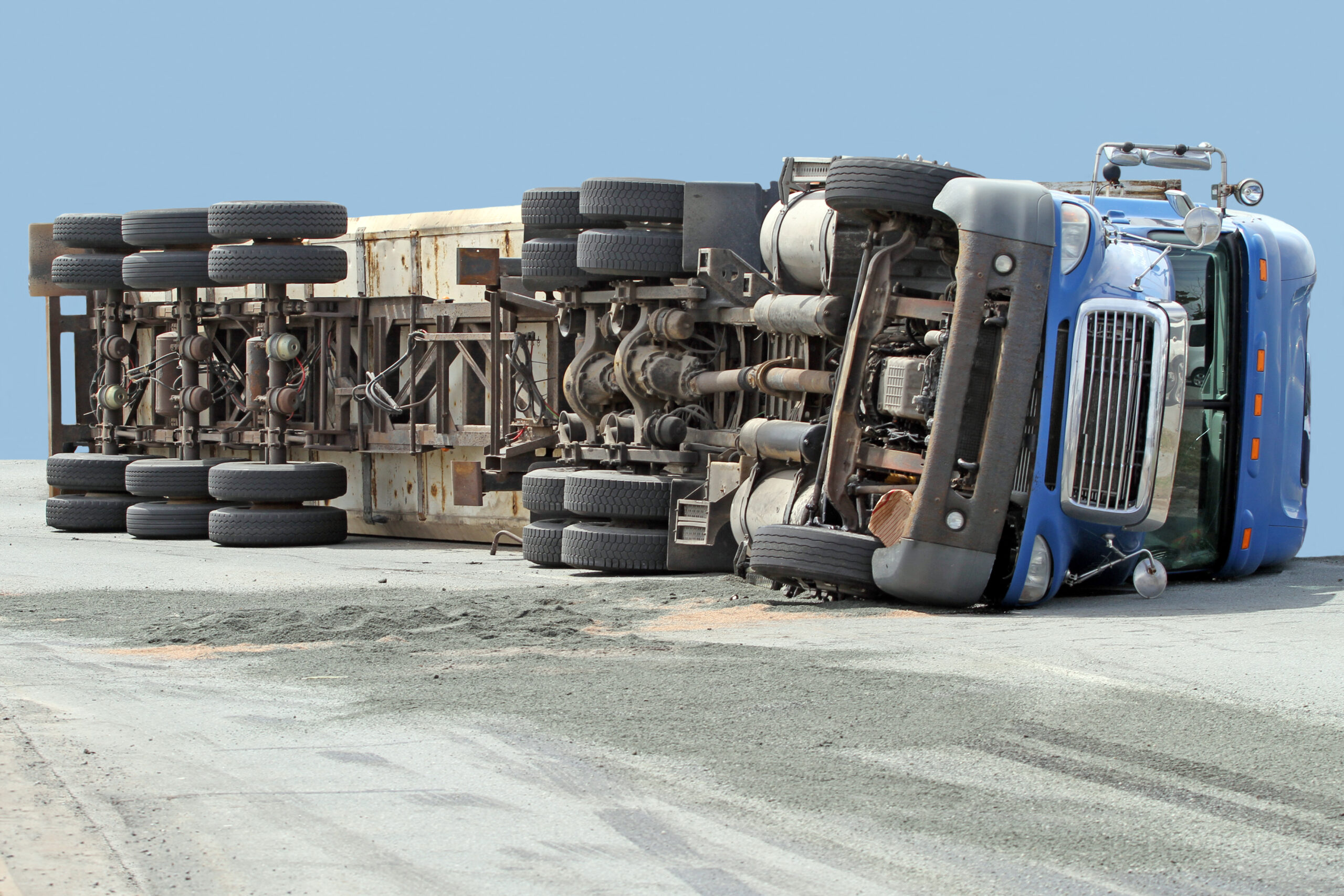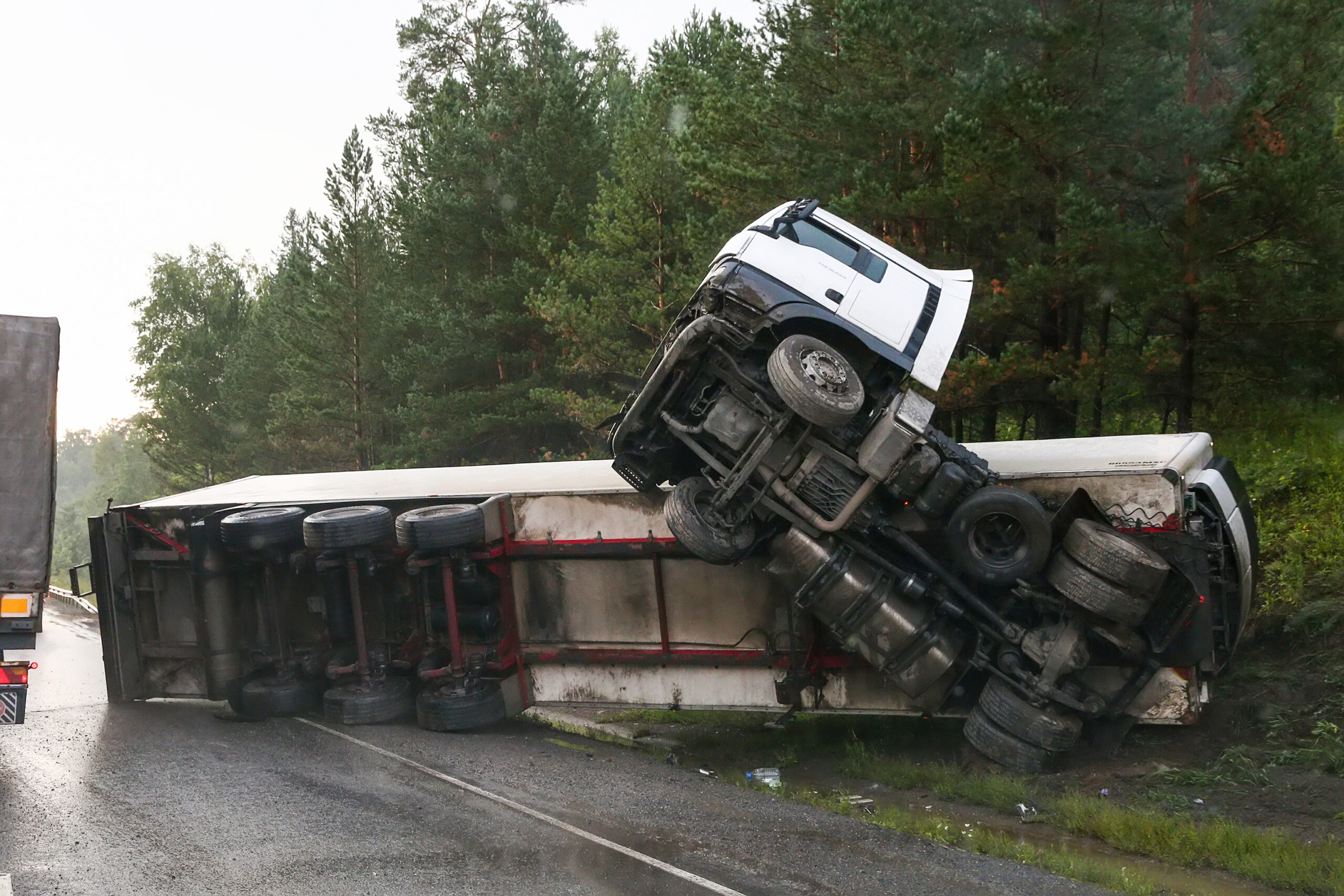Common Types of Truck Accidents in Pennsylvania
In 2022, Pennsylvania witnessed a disturbing escalation in road safety concerns, as the Pennsylvania Department of Transportation compiled data that indicated fatal crashes involving heavy trucks reached their highest level in the last five years. This alarming trend highlights the urgent need to address the underlying factors contributing to these tragic events, ranging from driver fatigue and distraction to inadequate vehicle maintenance and challenging road conditions. If you have been injured in a truck accident or a family member has died as the result of one of these types of truck accidents, contact PhillyLaw for a free consultation with a skilled truck accident lawyer to learn more about your ability to seek compensation for these injuries.

In the complex landscape of Pennsylvania roadways, distinct patterns emerge in the types of commercial truck accidents occurring. Common types of truck accidents include:
Jackknife Accidents
Jackknife truck accidents occur when the trailer of a large truck, such as a semi-truck, folds at the pivot point between the tractor-trailer and the cab, resembling a folding pocket knife. This type of truck accident is particularly dangerous. It can be caused by various factors, including sudden braking, slick road conditions, when a truck driver loses control or improperly turns. When a truck jackknifes, it often sweeps across multiple lanes of traffic, creating a significant hazard for other vehicles. The aftermath of jackknife accidents can involve multiple vehicle collisions and severe injuries, making it imperative for truck drivers to exercise extreme caution, especially under adverse weather conditions or when transporting heavy loads.
Wide-Turn Accidents
Wide-turn truck accidents represent a common yet hazardous type of truck accident, particularly in urban settings where roads may be narrower and more crowded. This type of truck crash occurs when a large truck makes a right turn but needs to swing left initially to negotiate the turn, inadvertently entering adjacent lanes. This maneuver can trap smaller vehicles between the truck and the curb or lead to collisions with unsuspecting motorists who the truck encroaches upon. Wide-turn accidents are especially perilous for pedestrians and cyclists, who might find themselves in the truck’s blind spots.
Rear-end Accidents
Rear-end truck accidents are one of the more devastating types due to the sheer size and weight differences between large trucks and passenger cars. These types of truck accidents often occur when trucks cannot stop quickly enough to avoid crashing into the rear of a slower or stationary vehicle ahead, which can be exacerbated by heavy loads, high speeds, or poor braking system maintenance, leading to brake failure. The impact of a large commercial truck rear-ending a smaller passenger car can lead to catastrophic injuries or fatalities, underscoring the importance of maintaining safe following distances, attentive driving practices, and regular vehicle maintenance checks.
Underride Accidents
Underride truck accidents are among the most horrific road incidents, occurring when a passenger vehicle collides with a truck and gets trapped or crushed beneath the truck’s trailer. This type of truck accident often results in severe injuries or fatalities, primarily due to the passenger vehicle’s safety features being rendered ineffective against the high clearance of a truck’s trailer. Factors contributing to underride accidents include poorly lit trucks, sudden stops by trucks, or a lack of underride guards—safety devices designed to prevent vehicles from sliding underneath trucks during a truck crash.
Rollover Accidents
A truck rollover accident occurs when a truck tips over onto its side or roof, often due to losing control or executing a turn at too high a speed. The likelihood of rollovers increases with improperly loaded or overweight cargo, which can shift unexpectedly during maneuvers, altering the vehicle’s center of gravity and causing the driver to lose control. Truck rollovers are particularly dangerous for the truck driver and nearby vehicles, as the truck can block multiple lanes or collide with other vehicles during the rollover.
Blind Spot Accidents
Large tractor-trailers have substantial blind spots (“No Zones“) where vehicles may be invisible to the truck driver. Maneuvering without awareness of these zones can lead to collisions during lane changes or turns.
T-Bone Accidents
T-Bone accidents, also known as side-impact collisions, occur when the front of a truck crashes directly into the side of a passenger vehicle. These accidents are most common at intersections, where a truck may fail to stop for a red light or stop sign, colliding with other vehicles crossing legally. The structure of a vehicle’s side offers less protection to passengers than the front or rear, making T-Bone accidents particularly dangerous and often resulting in serious injuries or fatalities. Distracted driving, fatigue, and failure to obey traffic signals contribute to T-Bone accidents.
Head-on Collisions
Head-on collisions involving large trucks are among the most lethal accidents on the road, often resulting in severe injuries or fatalities. These crashes typically occur when a truck crosses into oncoming traffic, potentially due to driver fatigue, distraction, or navigating incorrectly on one-way streets or highway exits. The high speed at impact and the substantial mass of a commercial truck amplify the devastation of these accidents, making survival and recovery for the smaller vehicle’s occupants significantly more challenging. Preventing head-on collisions requires rigorous driver training, adherence to driving hours regulations to combat fatigue, and technology such as lane departure warning systems to alert drivers if they are veering off course.
Tire Blowouts
Truck tire blowouts on large commercial trucks present a unique set of dangers on the roadways, often leading a truck driver to lose control and potentially catastrophic accidents. These incidents can occur for various reasons, such as improper tire maintenance, overloading, or failing to replace worn tires. The sudden loss of pressure in a tire can cause a truck to veer unpredictably, posing a significant risk to the truck driver and nearby vehicles. The aftermath may range from a single-vehicle incident to multi-car pile-ups, depending on traffic conditions and the truck driver’s response to the blowout. It is critical for trucking companies and drivers to conduct regular tire inspections, adhere to manufacturer load ratings, and replace tires as recommended to prevent these dangerous occurrences. Implementing these measures can significantly reduce the risk of tire blowout accidents on the road.
Understanding these common accident scenarios is crucial for preventing future tragedies on the road. Both truck drivers and other roadway users must stay informed and exercise caution to reduce the frequency of these hazardous incidents.

Causes of Common Truck Accident Types
The causes of truck accidents are multifaceted and can vary significantly depending on the type of accident. However, several core factors frequently contribute to these incidents, including:
Truck Driver Fatigue
Long hours on the road without adequate breaks can lead to fatigued drivers, one of the primary causes of truck accidents. Fatigue impairs judgment, slows reaction times, and can even lead to falling asleep at the wheel, escalating the risk of truck accidents, particularly head-on collisions and lane departure incidents.
Poor Vehicle Maintenance
Failure to properly maintain a truck can lead to catastrophic failures on the road. This includes inadequate attention to brakes, tires, and lights. For example, tire blowouts often result from poor maintenance practices, while brake failures can lead to the inability to stop, contributing to rear-end collisions and T-bone accidents.
Truck Driver Inattention
The rise of mobile technology has significantly increased the instances of distracted driving, which has led to driver error. Truck drivers distracted by their phones, navigation systems, or other electronic devices are less aware of their surroundings, increasing the probability of lane changes without noticing vehicles in blind spots or failing to adhere to traffic signals, leading to severe accidents.
Improper Loading
Improperly loaded or overloaded trucks can create imbalance or excessive weight, making it difficult for drivers to control their vehicles, especially in emergencies. This can lead to jackknife accidents, where the trailer swings out and forms an acute angle with the tractor, contributing to tire blowouts due to excessive pressure.
Speeding and Aggressive Driving
Speeding reduces a driver’s ability to react to road conditions or the actions of other drivers. Aggressive driving behaviors by truck drivers, such as tailgating, unsafe lane changes, and speeding, magnify the risk of accidents by diminishing safety margins. Impacts between a speeding truck and a smaller car are particularly devastating, making trucking accidents like a head-on collision and a rear-end collision more likely to be fatal accidents.
Inadequate Training
Driving a commercial truck requires skill and knowledge of safe driving practices, especially under varying road and weather conditions. Inadequately trained truck drivers are more likely to make errors in judgment that can lead to accidents, highlighting the importance of comprehensive training programs for all commercial truck drivers.
Addressing these causes requires a concerted effort from trucking companies, drivers, and regulatory bodies to implement strict adherence to safety practices, rigorous maintenance schedules, and continuous education and training for drivers. By tackling these issues, the rate of truck accidents can be significantly reduced, enhancing road safety for all users.

Types of Commercial Vehicles
Commercial trucks come in a variety of shapes and sizes, each designed for specific tasks and cargo types. Among the most common are:
Semi-Trailer Trucks
Also known as a tractor-trailer, a semi-truck is the most prevalent commercial truck on highways. They consist of a tractor unit that tows one or more semi-trailers to carry freight.
Box Trucks
Recognizable by their rectangular cargo areas, box trucks are used for transporting furniture, appliances, and smaller freight loads. They are a common sight in urban deliveries.
Flatbed Trucks
These trucks have an open trailer, sometimes called a lowboy, which is ideal for hauling heavy or oversized loads that may not fit inside a standard trailer. Cargo can include construction equipment, large containers, or lumber.
Tanker Trucks
Designed to carry liquid or gas cargo, tanker trucks are equipped with large tanks and are critical in the transportation of fuel, chemicals, and other hazardous materials.
Dump Trucks or Garbage Trucks
Utilized in construction, mining, and infrastructure projects, dump trucks and garbage trucks are designed to carry heavy materials such as sand, gravel, or demolition waste. They have a unique mechanism that allows the bed to tilt and the load to be dumped out at the site.
Refrigerated Trucks
Often referred to as reefers, these trucks have temperature-controlled trailers. They are essential for transporting perishable goods, such as food and pharmaceutical products, over long distances.
Car Carriers
These specialized trailers are designed to transport vehicles from manufacturers to dealerships. They can carry multiple passenger vehicles on two or more stacked levels.
Understanding the diverse range of commercial trucks is essential in appreciating their roles in the logistics and transportation industry. Each truck type is tailored to its specific cargo to ensure efficiency, safety, and the integrity of the goods transported.
PhillyLaw Will Help Truck Accident Victims and Their Families Seek Compensation
At PhillyLaw, our truck accident lawyers understand complex trucking regulations, the trucking industry, and the challenges truck accident victims face when seeking justice. Our experienced truck accident attorneys are adept at navigating these complexities to ensure that victims receive the compensation they deserve for their injuries, lost wages, and suffering. Whether the accident was caused by negligent driving, inadequate vehicle maintenance, or failure to adhere to safety regulations, the truck accident attorneys at PhillyLaw stand ready to advocate on your behalf. Our goal is to ensure that the trucking company fulfills its obligations to maintain safety on the roads and to support victims in their recovery process. Contact us today for a free consultation.
